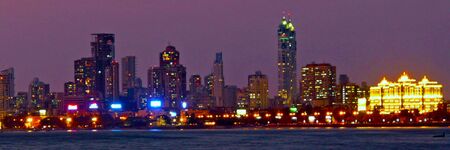Mumbai India
- Members
Mumbai also known as Bombay is the capital city of the Indian state of Maharashtra and the de facto financial centre of India. According to the United Nations, as of 2018, Mumbai is the second-most populous city in India after Delhi and the eighth-most populous city in the world with a population of roughly 2 crore (20 million). As per the Indian government population census of 2011, Mumbai was the most populous city in India with an estimated city proper population of 1.25 crore (12.5 million) living under the Brihanmumbai Municipal Corporation. Mumbai is the centre of the Mumbai Metropolitan Region, the sixth most populous metropolitan area in the world with a population of over 2.3 crore (23 million). Mumbai lies on the Konkan coast on the west coast of India and has a deep natural harbour. In 2008, Mumbai was named an alpha world city. It has the highest number of millionaires and billionaires among all cities in India. Mumbai is home to three UNESCO World Heritage Sites: the Elephanta Caves, Chhatrapati Shivaji Maharaj Terminus, and the city's distinctive ensemble of Victorian and Art Deco buildings designed in the 19th and 20th centuries.
Activities

|
India Stack | |
| India Stack is the moniker for a set of open APIs and digital public goods that aim to unlock the economic primitives of identity, data, and payments at population scale. | ||

|
Open Network for Education and Skilling Transactions | |
| The Open Network for Education and Skilling Transformations (ONEST) is a decentralized network aiming to democratize education by providing accessible and equitable access to a wide range of learning materials and skill development opportunities, connecting learners, education providers, employers, and facilitators across a single platform, effectively bridging the skill gap and enhancing employability | ||
Details
The seven islands that constitute Mumbai were earlier home to communities of Marathi language speaking Koli people. For centuries, the seven islands of Bombay were under the control of successive indigenous rulers before being ceded to the Portuguese Empire, and subsequently to the East India Company in 1661, through the dowry of Catherine Braganza when she was married off to Charles II of England. During the mid-18th century, Bombay was reshaped by the Hornby Vellard project, which undertook reclamation of the area between the seven islands from the sea. Along with construction of major roads and railways, the reclamation project, completed in 1845, transformed Bombay into a major seaport on the Arabian Sea. Bombay in the 19th century was characterised by economic and educational development. During the early 20th century it became a strong base for the Indian independence movement. Upon India's independence in 1947 the city was incorporated into Bombay State. In 1960, following the Samyukta Maharashtra Movement, a new state of Maharashtra was created with Bombay as the capital.
Mumbai is the financial, commercial, and the entertainment capital of India. It is also one of the world's top ten centres of commerce in terms of global financial flow, generating 6.16% of India's GDP, and accounting for 25% of industrial output, 70% of maritime trade in India (Mumbai Port Trust and JNPT), and 70% of capital transactions to India's economy. Mumbai has the eighth-highest number of billionaires of any city in the world, and Mumbai's billionaires had the highest average wealth of any city in the world in 2008. The city houses important financial institutions and the corporate headquarters of numerous Indian companies and multinational corporations. It is also home to some of India's premier scientific and nuclear institutes. The city is also home to Bollywood and Marathi cinema industries. Mumbai's business opportunities attract migrants from all over India.

